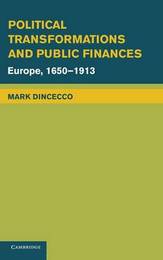
|
Political Transformations and Public Finances: Europe, 1650-1913
Hardback
Main Details
| Title |
Political Transformations and Public Finances: Europe, 1650-1913
|
| Authors and Contributors |
By (author) Mark Dincecco
|
| Series | Political Economy of Institutions and Decisions |
|---|
| Physical Properties |
| Format:Hardback | | Pages:250 | | Dimensions(mm): Height 229,Width 152 |
|
| Category/Genre | Development economics
Economic history
Public finance |
|---|
| ISBN/Barcode |
9780521192330
|
| Classifications | Dewey:336.309 |
|---|
| Audience | | Professional & Vocational | |
|---|
| Illustrations |
23 Tables, unspecified
|
|
Publishing Details |
| Publisher |
Cambridge University Press
|
| Imprint |
Cambridge University Press
|
| Publication Date |
26 September 2011 |
| Publication Country |
United Kingdom
|
Description
How did today's rich states first establish modern fiscal systems? To answer this question, Political Transformations and Public Finances by Mark Dincecco examines the evolution of political regimes and public finances in Europe over the long term. The book argues that the emergence of efficient fiscal institutions was the result of two fundamental political transformations that resolved long-standing problems of fiscal fragmentation and absolutism. States gained tax force through fiscal centralization and restricted ruler power through parliamentary limits, which enabled them to gather large tax revenues and channel funds toward public services with positive economic benefits. Using a novel combination of descriptive, case study and statistical methods, the book pursues this argument through a systematic investigation of a new panel database that spans eleven countries and four centuries. The book's findings are significant for our understanding of economic history and have important consequences for current policy debates.
Author Biography
Mark Dincecco is an Assistant Professor in the Department of Political Science at the University of Michigan. His research and teaching interests include political economy, economic and political history, comparative politics, and public finance. He holds a PhD in economics from the University of California, Los Angeles, and has published in several academic journals.
Reviews'Mark Dincecco has set a keystone atop the new literature seeking to explain the stark international differences in the modern rise of government financial capacity. We have long wondered whether government centralization and limitations on executive power have shaped the ability to wage war and to invest in modern economic growth. Previous authors have been forced to narrate within smaller, more constrained contexts, in search of easy natural experiments. Dincecco takes advantage of the very historical breaks that have constrained others. His structural-breaks perspective neatly captures both the unique and the general effects of institutional shocks. The book will command attention among all social scientists seeking a deeper understanding of the political and historical sources of government fiscal crises.' Peter H. Lindert, Distinguished Research Professor of Economics, University of California, Davis 'In a pioneering work of political economy and economic history, Mark Dincecco analyzes how European states developed effective fiscal systems that could fund wars, pay for education and public works, and cut the risk on sovereign debt. The two essential steps were political centralization and limiting the power of absolute rulers, with most European states taking the first step during the French Revolution and the second one later in the nineteenth century. Dincecco tests his argument with nearly three centuries of magnificent quantitative data. The results will be of great interest to economists, historians, sociologists, and political scientists.' Philip T. Hoffman, Rea A. and Lela G. Axline Professor of Business Economics and Professor of History, California Institute of Technology 'This book conclusively establishes that it was the institutional innovations of state centralization and representative government that created the modern fiscal state in Europe. A fundamental work.' James A. Robinson, Harvard University
|